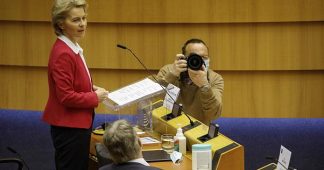The Commission proudly shows off its new armoury. To obtain financial support from the Recovery and Resilience Facility, Member States must implement European Semester recommendations. The march towards an authoritarian Europe must be stopped.
Martin Höpner is a political scientists and research group leader at the Max Planck Institute for the Study of Societies in Cologne, Germany. Contact: hoepner@mpifg.de
A remarkable story appeared in the press quite recently. The European Commission had made it clear to Germany’s Chancellery and its Ministries for Finance and Economic Affairs that the country must improve its reform programme if it is to receive the 24 billion euro financial support due from the Recovery and Resilience Facility (RRF). In detail, according to reports in the Handelsblatt (25 January 2021) and the Frankfurter Allgemeine Zeitung (26 January 2021), Germany was called upon to reform its too progressive tax system, strengthen the financial sustainability of its pensions system, open up the regulated professions and abolish Ehegattensplitting (the rules on the joint income taxation of married couples).
That is rather curious. Aren’t the conditionalities for obtaining RRF support supposed to address how the money is actually spent, issues of digitalisation and climate change, and the rule-of-law requirement? Does Ehegattensplitting now fall within the EU’s competence? Or does it, without us ever having noticed the fact, contribute to the inequalities within Europe that are indeed in need of correction and, as a result, come within the sights of the macroeconomic surveillance and correction procedure that has long been underpinned with the possibility of sanctions? Even if that were the case (frankly, it’s not obvious), what has it got to do with the RRF? Let us take a closer look at the facts and analyse the situation.
Conditionalities have migrated to the RRF
The marathon negotiations at the European Council meeting in July 2020 led to the decisions to establish a recovery fund financed through joint borrowing, which over the next three years will make available grants of 312.5 billion euro and loans of 360 billion euro (for an economic analysis see here (in German)). A fifth of the funding is earmarked to accelerate the digital transition and a third for tackling climate change. The funding is to be allocated amongst the participating countries using a key which takes account of economic prosperity, the severity of last year’s COVID-related economic contraction and unemployment levels.
Funding of this kind cannot be pushed around the continent without any conditions or controls. The purposes must be defined and controls are undoubtedly necessary to ensure that the funding does not disappear into a mire of corruption. Everyone agrees on that. However, the Commission, the European Parliament (EP) and certain Member States, above all the northern “frugal five”, wanted more. They wanted the RRF to be coupled to requirements that have nothing to do with its objectives and procedures. Particularly the EP was keen to have a hard rule-of-law requirement to be in a position to take action against Poland and Hungary and particularly the Commission wanted a linkage to the country-specific recommendations of the European Semester.
The negotiations around these conditionalities rumbled on for almost six months, with an agreement finally reached through the trilogue procedure involving the Commission, Council and EP just before Christmas on 17 December 2020. Unfortunately, the reporting that followed focused almost exclusively on the mechanism to enforce the rule-of-law requirement. As a result, a crucial element remained hidden from view: the Commission’s across-the-board success in linking the RRF to the country-specific requirements of the European Semester. It now has exactly what it wanted from the outset.
The European Semester
The European Semester has been in existence, at least under this name, since 2011. It unifies several procedures by which the EU, without requiring any legislative competence in the area, can give recommendations for reform, entailing different degrees of insistence, to its members. These include the general country-specific recommendations which have been addressed to the Member States since the introduction of the Europe 2020 Strategy; the deficit procedure, underpinned by sanctions for members of the eurozone, which results from the 1997 Stability and Growth Pact; and the macroeconomic surveillance and correction procedure introduced in 2012, under which, as a final resort, sanctions are also possible for non-compliance. In other words, a complicated proliferation of procedures, which are rightly brought together in the annual Semester cycle, ensuring at the very least that the recommendations from the individual procedures do not grotesquely contradict one another.
The European Semester is no bad thing. Why shouldn’t the Commission compare the policies of EU countries, identify objectives and, where possible, best practices, consider the extent to which the practices identified are capable of generalisation and transfer and formulate recommendations? And why shouldn’t it be allowed also to ensure that these are given more than a cursory nod, in other words, that, at the very least, the governments addressed engage seriously with the recommendations and have to formulate a response to the Commission? Even if the recommendations resulting from the Semester are, by their very nature, not always to one’s liking (to put it mildly), the EU should not give up on the pursuit of such “soft” forms of coordination in addition to common legislation.
But caution is needed. If, gradually, the recommendations are reinforced with increased possibilities for sanctions, at some point they are no longer recommendations but become instructions to democratically constituted legislators. European directives and regulations are ultimately instructions, too. In the case of the Semester, however, we are specifically talking about areas in which the EU has not adopted binding legislation. This is exactly the process in which we currently find ourselves. A procedure which, in actual fact, is intended to facilitate a soft form of coordination is increasingly equipped with sufficient bite as to transform non-binding recommendations into mandatory instructions that are underpinned by sanctions.
The Commission has long sought to achieve steering capabilities going beyond European legislation – and its efforts have met with success. The recent history of European integration is not one in which European legislative competences have been expanded but one involving a hardening of requirements existing over and above the legislation. The EU took a significant step in this direction during and after the euro crisis, introducing the macroeconomic correction procedure, underpinned by sanctions. Things went a step further in 2014 when the EU established the possibility to withhold payments from the structural funds for non-compliance with recommendations from the Semester. It has now continued down this path with the broad conditionalities attached to the RRF. A “significant subset” of the recommendations must be implemented in order to draw down funding from the RRF.
Strange choice of demands on Germany
The threat made towards Germany is, in the first instance, a symbolic act. The Commission wishes to demonstrate its new instruments of torture and has evidently decided that no half-measures are allowed. For its show of strength, it has chosen recommendations that are particularly politically controversial such as the abolition of Ehegattensplitting, where a microscopic search is needed to find any transnational problem. Anyone acting this way is looking for conflict. Also, this recommendation is not even included in the current 2020 country-specific recommendations; help only comes from a general reference to the continued pertinence of the recommendations from the previous year (point 24). Criticism of Ehegattensplitting is set out in point 16 of the 2019 recommendations.
Among the 2019 recommendations are some with much more obvious transnational implications, which would therefore have been better suited for a warning in connection with the RRF: the sluggish wage growth (point 2), the subdued rate of public investment, especially at municipal level (points 3 and 7), sparse levels of education expenditure (point 8), the below-target completion of new housing (point 13) and the continued decline in collective bargaining coverage (point 18) (as if the Commission had not launched an attack in Southern Europe on just this very feature!). There are also less politically controversial recommendations that the Commission could have chosen, for example, a correction to the low revenues from environmental taxes in Germany (point 15) or the reinforcement of the teaching profession (point 19). And in the context of the pandemic, which, after all, was the impetus for the RRF, an admonition to increase the attractiveness of the nursing profession would have been highly understandable (this demand is included also in the current 2020 recommendations, point 19).
Yet, the Commission’s provocation will not cause any sleepless nights to the civil servants in the Chancellery and the Ministries involved. The likelihood that this show of strength will result in a withholding of the funding allocated to Germany under the RRF is practically zero. The German recovery and resilience plan, to which the Commission was reacting, is anyway only a draft (available here in German, details concerning the compatibility with the recommendations from the Semester are set out on pp. 14-15). The final, corrected version of the plan must be submitted to the Commission in April of this year, which will first assess it before the Council gives its expected approval as qualifying for release of the funding. Yet, that should not obscure us as to the wrong turning that European integration has taken here.
European integration going astray
To make my point clear, let us distinguish two different modes of European politics. In the first mode, the Member States establish the policy areas in which they want to act in common. On the choice between policy alternatives a common, Europe-wide discourse then ensues. The more such Europe-wide discourses take place, the greater the development of a European public – currently, at most, a weakly constituted phenomenon. Slowly a common political space with real European parties can then emerge and European politics can be democratically controlled through elections.
That is more or less the positive vision of European politics. At present, there is little to suggest that it will become reality. Unfortunately, the misguided introduction of the euro, in particular, did a disservice to the emergence of a common political space, resulting in a strengthening of conflict lines that run not between European parties but between countries. That is the exact opposite of a common political space. Resolution of the conflict cannot be democratised (parties can be elected, not countries). At the same, as good Europeans, do we not all wish for an increased chance of that vision becoming reality?
Yet, country-specific instructions from Brussels, instructions that vary from country to country, are something entirely different. They cannot be democratised at European level, that is to say, they cannot be controlled through democratic elections at European level because they entail not one substantive set but 27 different sets of instructions. And at Member State level they are destroying democracy. They do not denote the vision of a march towards a distant democratic Europe but the nightmare of an intensification of the existing technocratic, authoritarian Europe. Likewise they denote the hubris of Brussels to know better than the citizens on the ground what should happen next in the politics of the Member States. The results of this hubris are devastating.
Unfortunately, even in the progressive spectrum, reactions are mostly affirmative. The temptation to participate is obvious. The slumbering resources of power in authoritarian Europe are boundless and enticing. Who wouldn’t want a piece of that? Wouldn’t the whole thing somehow be acceptable if only the EP or the social partners could a get a foot in the door? Or perhaps the Committee of the Regions? I cannot warn vehemently enough against peace accords with the authoritarian mode of European politics. The only sensible way to deal with these aberrations of European integration is to minimise and eliminate them. For the RRF this means a fundamental rejection of all conditionalities that have nothing to do with how the funding is actually spent.
Published at braveneweurope.com










